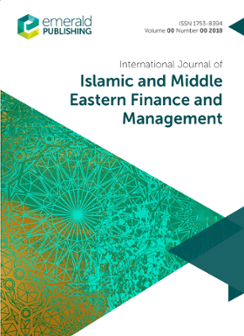International Journal of Islamic and Middle Eastern Finance and Management: Volume 14 Issue 4
Table of contents
The mura’ah al-khilaf and ma’alat method in fatwa decisions: its application for fatwa coordination related to conditional hibah in Malaysia
Fathullah Asni, Jasni SulongThe purpose of this paper is to study the differences in fatwa amongst official fatwa institutions in Malaysia comprising the State Mufti’s Departments (SMDs), the National Fatwa…
Do sukuk spur infrastructure development?
Houcem Smaoui, Karim Mimouni, Ines Ben SalahThis paper aims to examine the effect do Sukuk Spur Infrastructure Development of Sukuk market expansion on infrastructure development for a sample of 15 emerging countries over…
Are competition and performance friends or foes? Evidence from the Middle East banking sector
Mudeer Ahmed Khattak, Mohsin AliThis paper aims to investigate the impact of banking market competition on banks’ profitability and banks’ risk using a sample of six countries from the Middle East from 2006 to…
The effects of good governance and fraud prevention on performance of the zakat institutions in Indonesia: a Sharīʿah forensic accounting perspective
Ika Sari Wahyuni-TD, Hasnah Haron, Yudi FernandoThis study aims to investigate the direct and indirect effects of good governance and fraud prevention on the performance of Zakat institutions.
Trading rules and excess returns: evidence from Turkey
Massoud Metghalchi, Nazif Durmaz, Peggy Cloninger, Kamvar FarahbodThis paper aims to investigate popular technical trading rules (TTRs) applied to the FTSE Turkish all-cap and small-cap indexes from September 23, 2003 to August 9, 2019 to…
Testing the pecking order theory of capital structure in an Islamic legal system: the case of Saudi Arabia
Moncef Guizani, Ahdi Noomen AjmiThe purpose of this paper is to examine whether the basic premises according to the pecking order theory (POT) provide an explanation for the capital structure mix of firms…
Prudence and temperance in portfolio selection with Shariah-compliant investments
Amine Mohammed MounirThis paper aims to explore the impact of Sharīʿah-compliant stocks on other investor risk preferences beyond the risk aversion, namely, prudence and temperance.
A bibliometric analysis of the International Journal of Islamic and Middle Eastern Finance and Management
Mücahit Özdemir, Mervan SelçukThe purpose of this paper is to indicate the current state of studies on Islamic finance and management through a bibliometric analysis of the only social science citation index…
Comparative CSR decision-making in the Middle East: an exploratory study
Pierre El Haddad, Alexandre Anatolievich Bachkirov, Olga GrishinaThis study aims to explore the commonalities and differences of corporate social responsibility (CSR) perceptions among business leaders in Oman and Lebanon, two Middle Eastern…
Fiscal reform: a computable general equilibrium (CGE) analysis for the Kingdom of Saudi Arabia
Elizabeth Louisa Roos, Philip David AdamsThis paper aims to provide a quantitative assessment of the broad economic effects of tax policy reform in the Kingdom of Saudi Arabia (KSA).
The role of knowledge diffusion in evolving governance principles for Islamic banking
Adnan Malik, Karim Ullah, Shafiullah Jan, Muhammad Atiq, Ali AbdullahThis study aims to describe the role of knowledge diffusion in evolving governance principles for Islamic banking.

ISSN:
1753-8394Online date, start – end:
2008Copyright Holder:
Emerald Publishing LimitedOpen Access:
hybridEditor:
- Prof M. Kabir Hassan